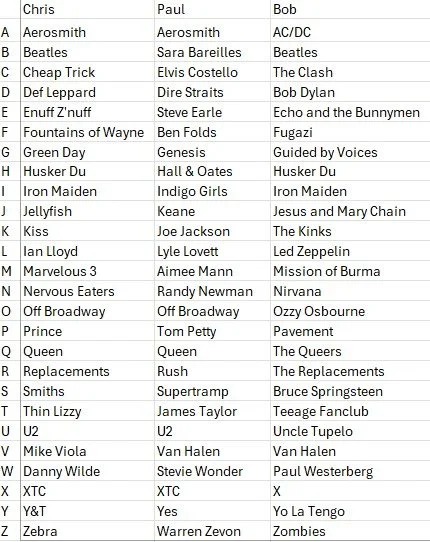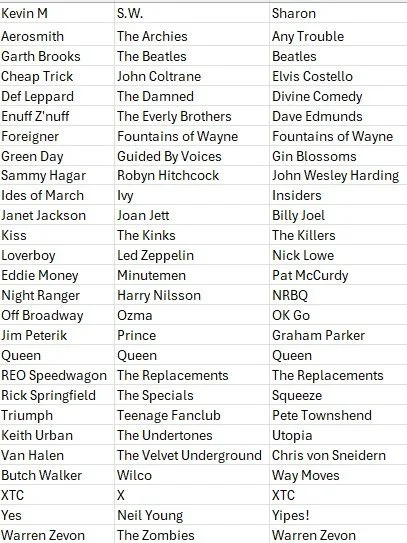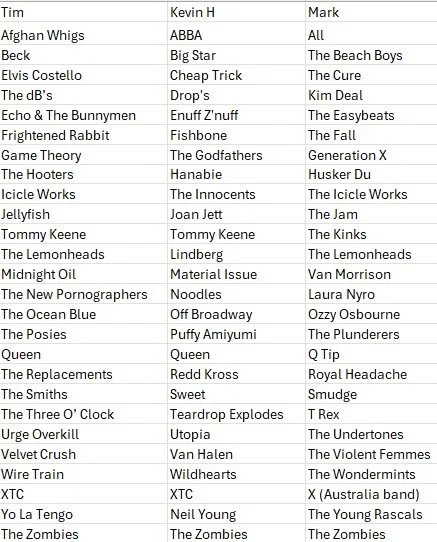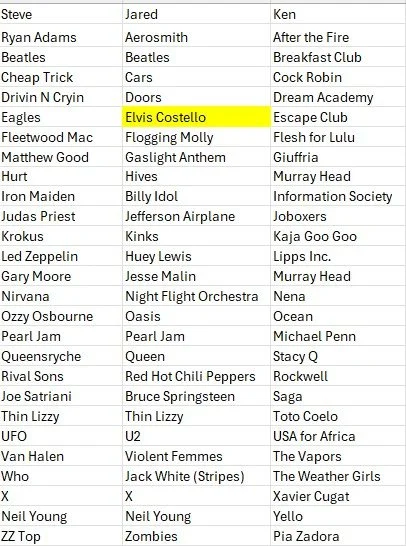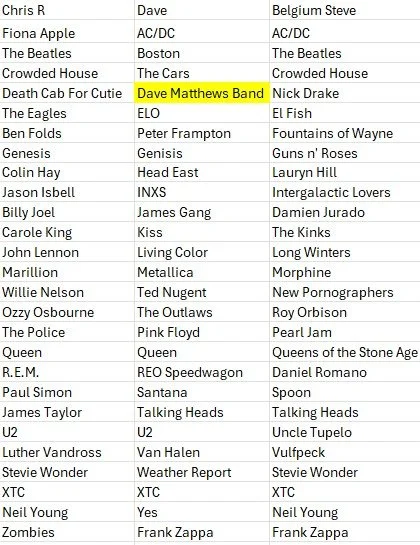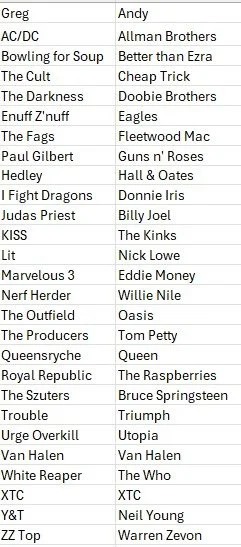Last week I highlighted eleven albums from the past thirty years that have grabbed my attention as of late. Below I’ve listed an additional twelve albums in reverse chronological order from the 50s through the 80s that have inspired me recently. Next week I’ll discuss new musical artists and their struggle to find an audience. Stay tuned.
Dire Straits – Love Over Gold (1982). Rewinding almost a decade from last week’s blog, this release was a regretful omission from my original list a few years ago. One of my all-time favorites. I’ll never forget camping up in Shawano, Wisconsin and awaking to the live version of “Telegraph Road” from the live Alchemy album (that is sadly unavailable on Spotify). It’s such a moody and moving piece, rivaled perhaps by the title track and “Private Investigations.” Wonderful.
Missing Persons – Spring Sessions M (1982). Back when I was a snotty little teenager, I played in a band called The Grab, and we did the song “Walking in LA” by Missing Persons. Something prompted me to listen to the whole album a few years ago, and my, oh my, what a powerhouse of a record, led by the then-husband/wife duo of Dale and drummer extraordinaire Terry Bozzio. The album still sounds fresh and present, not of its time despite the synths. This might have something to the superb drums – the work of Terry on “U.S. Drag” is ridiculous. In addition to “Walking in LA,” you probably know “Words,” “Windows,” and “Destination Unknown.” Once of those bands that never again reached the heights of their debut LP.
Donald Fagen – The Nightfly (1982). Make it a trifecta from 1982! Another album I overlooked in my top albums blogs, this is such a fun, positive and sophisticated album, in contrast to the ofttimes cynical Steely Dan. Not a bad cut on it. I love the comedic elements of the title track and the tight harmonies of “Walk Between Raindrops” and “Ruby.”
Jackson Browne – Hold Out (1980). I’ve already listed Browne’s 2014 masterpiece Standing in the Breach as one of my favorite albums, but this release from when I was 12 years old put him on the map for me, and it hangs together oh so well, with a great combination of rockers along with some heart-felt numbers. Friends of mine who are a bit older prefer Jackson’s earlier records, but for me those releases have amazing songs along with some real clunkers. Hold Out holds up! If you want an example of horrific rock journalism, read the original Rolling Stone review of this release. It’s a mess.
Cheap Trick – Dream Police (1979). Another one of those gems from the greatest year in music, I eliminated this from my original list of desert albums because of one song, “I Know What I Want,” but that was silly. The album is amazing! For me it’s one of the two best power-pop albums ever released, along with Off Broadway’s On. I have some friends for whom “Gonna Raise Hell” doesn’t work, but I could probably put that song on repeat for several hours before pressing pause. Marvelous.
Gerry Rafferty – City to City (1978). My son became familiar with “Baker Street” through a movie or game or something, and he would quiz me on the singer’s name, because, well, my mind is sometimes a jumbled mess of pop culture references and I can’t always keep things straight. But since then I dived into Rafferty’s City to City and I no longer have that problem. My favorite track – one that I have a faint recollection hearing in my childhood – is “Home and Dry,” without a doubt among my top 100 songs of all-time, but the whole album is strong. Rafferty has one of those voices that is instantly recognizable, but after a few follow-up albums, he disappeared from the charts.
Procol Harum – Grand Hotel (1973). I was told that their 1969 release, Salty Dog, was the bee’s knees, but this one wins the prize for me. Full of bombast that might turn some people off, I love the complex chord changes and soaring melodies of the title track, “TV Caesar,” and “A Rum Tale,” a lover’s lament if ever there was one. And there’s some humor here too with “A Souvenir of London,” which was banned from the radio at the time!
Stevie Wonder – Innervisions (1973). Another release from ’73 (a darn-good year for music – Quadrophenia, Goodbye Yellow Brick Road, Selling England by the Pound, Dark Side of the Moon, Houses of the Holy, Tales from Topographic Oceans, Band on the Run, etc.), I listened to this album in the car a few months ago, and damn, it’s nearly perfect, with Wonder doing the “wonderful” and handling virtually every instrument and vocal on the album. The funky tunes are balanced out nicely with the beautiful “All In Love Is Fair,” and “Visions,” a heartbreaking wish for a better world that seems especially current. The opening of “Living for the City” gives me chills. Perfect.
Rod Stewart – Every Picture Tells a Story (1971). I originally went back and forth on this one, but there’s simply no denying that this is a stupendous effort from Stewart. The music is rough and raw and sloppy, the downbeats often played by three instruments at three different times, but damn, the energy the band (basically The Faces) exudes is infectious. One of those country-tinged efforts that I often eschew, but this one hits the mark for me, with wisely-chosen covers balancing out the marvelous “Mandolin Rain,” Maggie May,” and – among my favorites ever – the inimitable title track.
Emitt Rhodes – Emitt Rhodes (1970). Chalk another one up for Spotify. While listening to Utopia’s self-titled 1982 release (which has already made by best-of list), the streaming service’s algorithm played the song “Somebody Made For Me” and my ears pricked up. Rhodes is another one of those artists like Nick Drake and Rodriquez who didn’t make the splash he deserved and got royally screwed by the record company. This is a power-pop masterpiece, with every instrument and vocal performed by the man himself. There’s a nice 2009 documentary about Rhodes called The One Man Beatles, and after a 43 year hiatus he managed to put out an album in 2016 before dying in 2020. Here’s a nice summary of another record collector’s discovery of this fantastic musician. Isn’t it cool that my knowledge of Utopia led to Emitt Rhodes who then led to The Red Button (mentioned in last week’s blog). The musical rabbit holes you can go down are endless, especially since the advent of streaming services.
The Zombies – Odessey & Oracle (1968). Yeah, I apparently was the only person on the planet who had never heard of this album despite it being listed as one of the best on most rock album retrospectives. I came upon the 2008 40th anniversary live concert of this album on Spotify and actually like it better than the original release. The transition from “Brief Candles” to “Hung up on a Dream” makes to cry every time. I don’t know why, but the crowd reaction helps, and the chord progression of the latter tune is perfect, surprising the listener with the six-major chord after what starts as a very basic sequence. I’ve since discovered that my daughter sometimes plays “This Will Be Our Year” for her psych patients as a music therapist. Nice! Odessey & Oracle is the first new-pressing album I purchased since 1986! I’ve purchased quite a few more since then. Once you break the seal, you’re in trouble.
Wild Bill Davison – Pretty Wild (1956). This one is courtesy of my dad, who cleared out a bunch of his vinyl a half a decade ago or so, and I inherited a couple of dozen jazz records, some of which I’d neglected to listen to until recently. This recording is one of those lilting listens that calms my nagging nerves, neither calling too much attention to itself nor putting me to sleep. I don’t know if this is considered great jazz, but the combo of strings and Davison’s pure tone hits the spot.
So there you are! Twenty-three albums (between last week and this week) that have caught my attention over the past three years. Some of it old and familiar, much of it old and oddly unfamiliar to me, and a couple of newer releases.
There are some people who argue that there isn’t any good music today, to which I cry, bullshit. It’s harder to find good music on the radio than ever before, but there is so much good music coming out today it’s overwhelming. I’ll write about new music and how it’s harder and harder for today’s artists to find an audience in next week’s blog.
